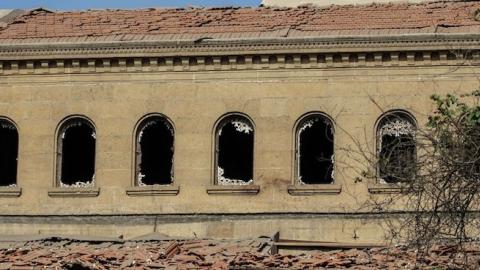A bomb went off in Egypt’s main Coptic Christian cathedral on Sunday, killing dozens and exposing once again the stark religious tensions that still divide Egypt. The Wall Street Journal:
A bomb exploded at Cairo’s main Coptic Christian cathedral compound on Sunday morning, killing at least 25 people and wounding another 49, in the largest attack on a Christian house of worship in Egypt since 2011. […]
No group has claimed responsibility for the attack, which was quickly condemned by the Egyptian government and the head of Cairo’s Al-Azhar mosque, the seat of Sunni Islamic learning and one of the world’s oldest institutions of religious teaching. […]
The explosion comes at a time of heightened tensions between Egypt’s Muslims and Coptic Christians, who account for about 10% of its 90 million population and have accused Mr. Sisi of not doing enough to protect them. Mobs attacked Christians in the city of Minya several times this year over accusations they were illegally building churches, as police were slow to quell the violence.
It is worth mentioning that the Egyptian Copts are the last major Christian minority in the Middle East; most others have either been massacred or driven out since the closing decades of the 19th century.
Yet while some westerners may use this horrible human tragedy to posture about the moral superiority of Christianity to Islam, that is hardly justified by the evidence. Millions of Muslims were driven out of Russia and the Balkans in earlier years. In both cases, genocide, ethnic cleansing and terror were involved. And Muslims in Burma today are suffering at the hands of Buddhists in much the same way.
So no religion has a historic monopoly on having appalling crimes committed in its name, and smug westerners today need to keep that in mind. Nor do Christians have a monopoly on being victimized in the modern Middle East. Sunnis and Shi'a, to say nothing of Yazidis, Bahais and other religious minorities, suffer vicious persecution at the hands of deranged Iranian mullahs and crazed Sunni fanatics.
What is happening in Egypt is complicated. For decades, Egyptian Christians have been under pressure. In the south, Christian villages have been burned, and individual Christians have been targeted. Young women are forced into conversion and marriage with Muslims. There is subtle and sometimes not so subtle discrimination against Christians in many ways.
At the same time, wealthy Christians play a significant role in Egypt’s economy. Given the way things work in Egypt, this means that in many cases Christian businessmen have tight links with government officials. Just as has happened with many Jewish communities around the world, the small number of rich Christians create an impression among many poor Muslims that Christians as a whole are a pampered and privileged minority. In Egypt as in many other places in the Middle East, the Christian position is further complicated by the fear that Christians have of radical Islam—a fear that makes them, for the most part, faithful upholders of the status quo. Just as Christians tended to support Saddam in Iraq and Assad in Syria, they have, despite some misgivings, mostly rallied behind authoritarian governments. This makes Christians a target for those who oppose the government.
The attack on the Cairo church, then, serves three purposes. It demonstrates radical Islamist hostility to Christians. It demonstrates that the government cannot provide security and isn’t fully in control. And it frightens off tourists and investors, striking a blow at the government’s economic strategy.
Egyptians historically have had a stronger sense of nationalism than many Arab countries. Egypt has been around for thousands of years; it is not the artificial creation of European colonial powers. And that sense of Egyptian nationalism has often helped Egypt’s Christians: they may be a minority, but they are part of Egyptian history and culture. This helped protect Christians during earlier waves of violence that saw Egypt expel tens of thousands of Jews, Greeks, and others during the 20th century.
For radical Islamists and fanatic jihadis, this is a bug, not a feature. To tolerate Coptic Christians in the name of Egyptian nationalism is to substitute an earthly ideology for Islamic truth. For the radicals, there are no nations, there is only Islam.
Hopefully this ideology of hate will not put down deeper roots in Egypt; if it does, Egyptian Christians could be forced to flee in large numbers. As it is, the world must expect a steady stream of Egyptian Christian migrants wishing to escape the poverty, discrimination, and insecurity of their homeland. In the meantime, the Sisi government’s commitment to the safety and security of its Christian citizens should be remembered as a point in its favor by westerners contemplating its otherwise dismal human rights record.


















